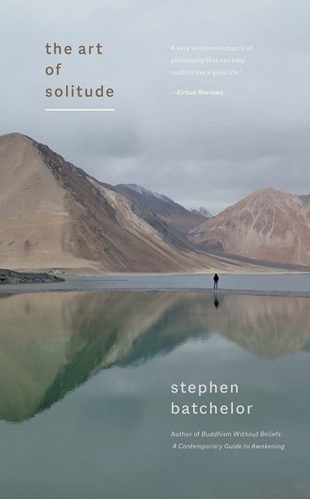We all need time alone, to recharge our mental, emotional, and spiritual batteries. Buddhist teacher and author Stephen Batchelor writes about this eloquently in this little book.
It is a quiet book. The chapters are untitled but move from one to the next with a cumulative effect, putting you into the practice of solitude. As Batchelor writes, at the outset, “I will treat solitude as a practice, a way of life.”
He draws upon wisdom of Buddhist sages, stories, and texts but also from other classic writers and artists including Seneca, Plato, Michel de Montaigne, Johannes Vermeer, T.S. Eliot, and John Cage.
Each chapter addresses solitude from a new perspective or practice, with a helpful exactitude that quickly moves readers beyond the platitudes of simpler books.
For example, chapter 22 looks at practicing the jhanas of Pali Buddhist meditation. “The jhanas describe an arc of four phases of collectedness, starting with a focused state of rapture and well-being accompanied by reflection and analysis, and culminating in a state of stillness and well-being characterized by lucidity and equanimity. They are presented as ways to stabilize and sharpen the mind in order to see more clearly into the nature of things.”
As is often the case with meditation practices, this one is followed in specific, not generalized, ways. So Batchelor relays the teachings of a German nun, Ayya Khema, on the jhanas. She focused her students on their breathing with mindfulness, but then specifically, “turn your attention to the sensations on your upper lip created by the passage of inhalations and exhalations. Over time, these sensations coalesce into what feels like a solid, fixed point. Once you can sustain attention on this point for several minutes, you gently smile to yourself and shift your focus to the pleasurable feeling that accompanies your smile.”
This is one among many examples of how The Art of Solitude aims to return the reader to themselves, because practicing solitude is also a way to “dedicate yourself to the care of the soul” — an important form of compassion — and find your own path and voice.
Batchelor aims to help you become more proficient in meditation techniques that expand beyond sitting still and seeking insight and include curiosity, compassion, care, equanimity, and what he calls collectedness. This sounds like what many of us need.
